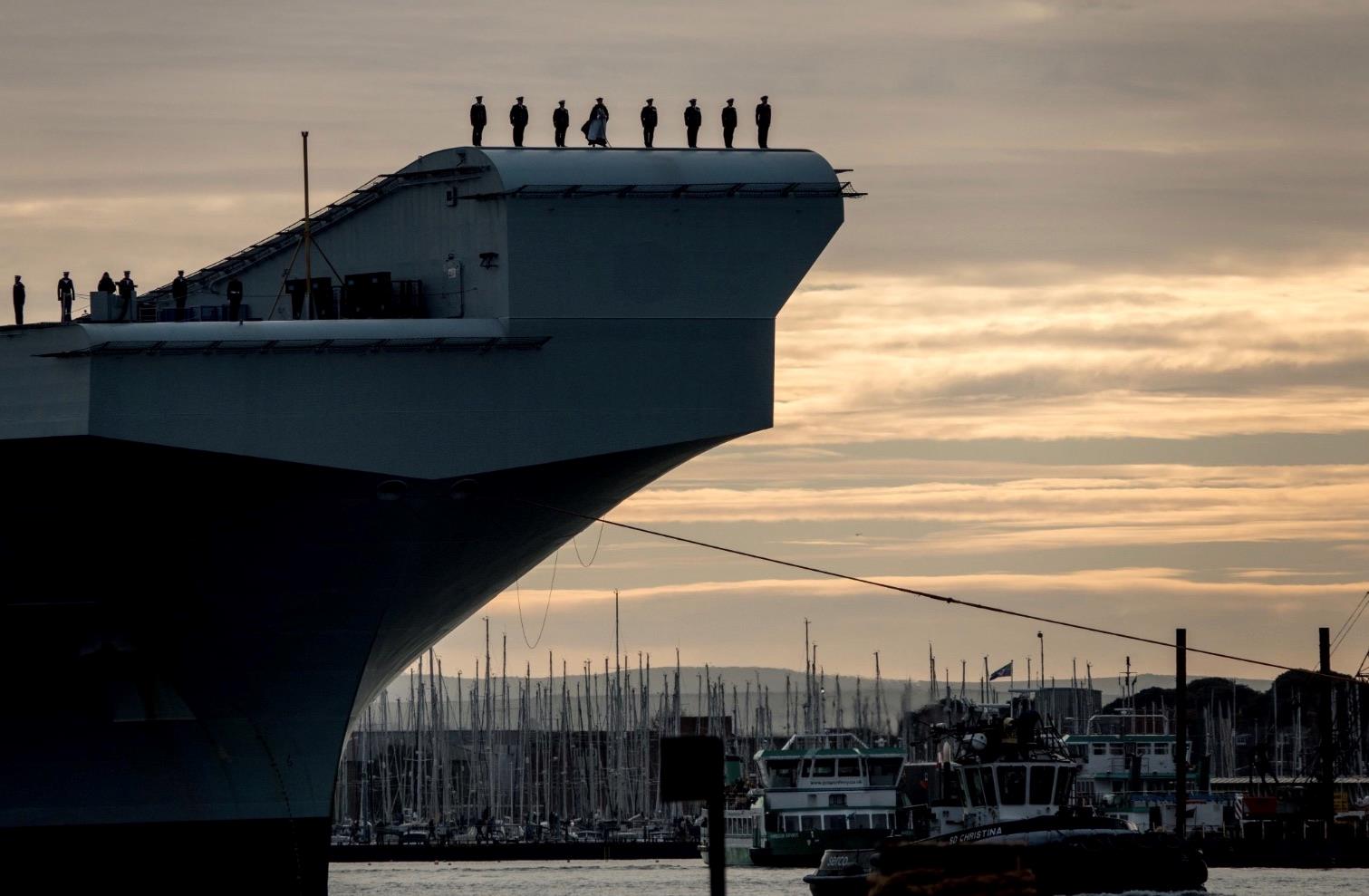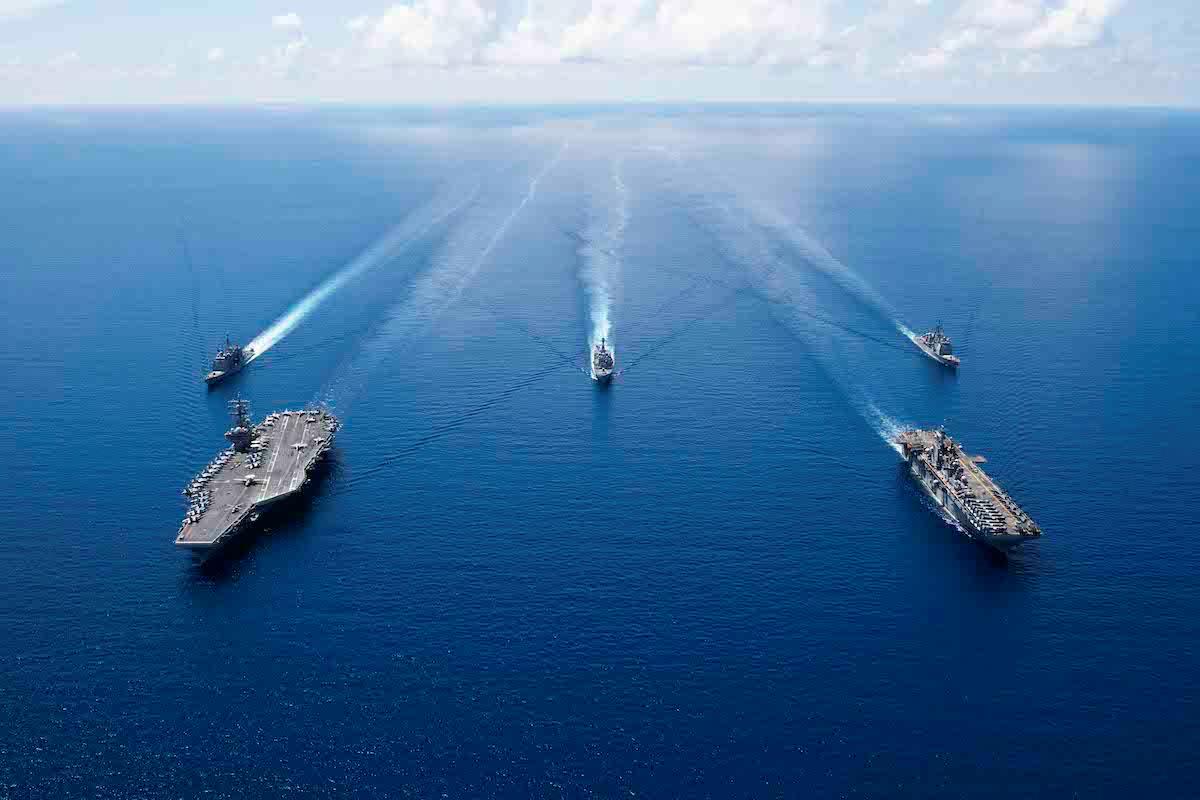(MENAFN- Asia Times) In what seems like more than a coincidence, the United Kingdom's (UK) largest naval contingent in recent memory has conducted unprecedented drills off the coast of Singapore just hours before the US Secretary of State Lloyd Austin's much-awaited address at Singapore's annual Fullerton Forum.
This week saw the UK's Carrier Strike Group, led by the 65,000-tonne carrier aircraft carrier HMS Queen Elizabeth, and the Republic of Singapore Navy (RSN) hold joint naval exercises close to the hotly disputed South China Sea.
This was the first time that the Royal Navy's 5th generation Carrier Strike Group exercised alongside the RSN, which has been rapidly expanding its security cooperation with the US and other allied powers in recent years. Just days earlier, the British contingent conducted joint drills (July 21-22) with the Indian Navy in the Bay of Bengal.
Over the coming weeks, the British naval contingent is expected to pass through China's adjacent waters, from the South China Sea to the Taiwan Straits, en route to Japan a fellow US ally. To assert its often underappreciated status as a“resident power” in the Indo-Pacific , Britain has also announced that it will permanently deploy at least two warships for operations across the region.
Since May, the HMS Queen Elizabeth-led Carrier Strike Group has been on a transoceanic voyage covering 40 countries across 26,000 nautical miles in order to project a post-Brexit“Global Britain.”
The Pentagon has warmly welcomed the British naval deployment as an expression of the European power's“commitment to an interconnected network of allies and partners, who mutually cooperate and support freedom of navigation and a rules-based order in the Indo-Pacific region.”
For China, which has vehemently opposed any large-scale European naval presence in the region, Britain is simply part of an emerging US-led counter-alliance aimed at containing the Asian superpower's naval ambitions.

The new British aircraft carrier Queen Elizabeth is en route to the region on her first operational deployment. Photo: AFP / Glyn Kirk
In a strongly-worded editorial , the state-backed Chinese tabloid Global Times lashed out at Britain as“Washington's running dog” and warned of“strong countermeasures” if the UK carrier group dares“to provoke the Chinese People's Liberation Army in the South China Sea.”
China's trepidations, of course, are not entirely unfounded. Top British officials have increasingly made it clear that they are committed to deepening military cooperation with China's regional rivals. The upshot is the gradual yet steady emergence of a de facto“Quad Plus” alliance, as Quadrilateral Security Dialogue powers of Australia, India, Japan and the United States rapidly expand naval cooperation with so-called like-minded European and Southeast Asian powers.
Earlier this year, the newly-appointed British High Commissioner to India, Alex Ellis, underscored his country's commitment“[to] working closely with India, Japan, US and Australia in this region.”
During his bilateral meeting with the US Secretary of Defense Austin in early July, British Defense Minister Ben Wallace emphasized the need for growing strategic coordination among like-minded powers. A week later, ahead of his meeting with Japanese Defense Minister Kishi Nobuo in Tokyo, Wallace reiterated the need for allies to “stick together” in face of shared threats, especially China.
“Following on from the strike group's inaugural deployment, the United Kingdom will permanently assign two ships in the region from later this year,” announced the British defense chief in a joint announcement with his Japanese counterpart shortly after.
The UK's Carrier Strike Group's deployment across the Mediterranean and the broader Indo-Pacific region this year carries major strategic implications, especially for China.
It provides London a prized opportunity to flex its naval muscle, test its newly-furbished HMS Queen Elizabeth carrier and enhance interoperability and defense diplomacy with major allies and strategic partners across vital chokepoints.
Over the past few months, the British naval contingent conducted joint drills with allies across the Mediterranean Sea and Horn of Africa . Before edging towards the South China Sea, the British naval contingent conducted drills with the Indian Navy during the Exercise Konkan in the Bay of Bengal, which featured as many as 4,000 personnel, 10 warships, two submarines and close to 20 aircraft.
“This enables both forces to advance their interoperability and cooperation ahead of further exercises when the [UK carrier strike group] returns to the Indian Ocean in the autumn,” the British High Commission said in a statement.

Naval officers atop the United Kingdom's HMS Queen Elizabeth aircraft carrier headed for the South China Sea. Photo: Twitter
“The joint endeavor provides tangible security to our friends and a credible deterrence to those who seek to undermine global security. An Indian warship will also exercise with the Royal Navy off the coast of the UK in August,” the statement added.
During its return voyage, the UK Carrier Strike Group is also slated to participate in the Five Power Defense Arrangements' Bersama Gold exercise, also known as Bersama Lima, the annual air and sea exercises among the UK and fellow Commonwealth nations of Australia, New Zealand, Singapore, and Malaysia.
Crucially, the UK naval contingent includes US destroyer USS The Sullivans (DDG-68), a US Marine Corps Fighter Attack Squadron, and Dutch frigate HNLMS Evertsen (F805), which reflects an unprecedented degree of interoperability among multiple allies.
For the first time s ince the end of World War II, US F-35B fighter jets took off from Britain's HMS Queen Elizabeth aircraft carrier during joint combat missions in the Middle East against transnational terrorist targets.
In another big first , the USS Ronald Reagan and the HMS Queen Elizabeth strike groups conducted joint exercises in the Indian Ocean earlier this month.
“Our team was proud to operate alongside the UK Carrier Strike Group during this unique opportunity to hone the full scope of our mutual capabilities,” said the commander of the Ronald Reagan Carrier Strike Group, Rear Admiral Will Pennington, in a statement, following the dual-carrier exercises between the two allies.
“By operating together at sea, we deepen our coalition partnerships and extend our global reach throughout the region's critical waterways,” the top US naval official added.
Growing naval interoperability between the US and UK, best demonstrated through multiple unprecedented exercises in recent months, has raised the prospect of regularized multilateral Freedom of Navigation Operations (FONOPs) across the South China Sea and the Taiwan Straits.
Just days into the Biden administration's term in office, the two allies signed a new joint US-UK declaration , which paved the way for expanded and more aggressive joint operations across the Indo-Pacific.
Down the road, Washington hopes to enlist a growing number of other allies into its regularized FONOPs, which aim at directly challenging Beijing's excessive claims around artificially created islands in the South China Sea.

This US Navy photo shows the aircraft carrier USS Ronald Reagan, the amphibious assault ship USS Boxer, and ships from the Ronald Reagan Carrier Strike Group and the Boxer Amphibious Ready Group under way in formation while conducting security and stability operations in the US 7th Fleet area of operations on October 6, 2019, in the South China Sea. Photo: AFP / Erwin Jacob V Miciano / Navy Office of Information
Expanded naval deployments by the US and its allies will make it increasingly difficult for China to dominate adjacent waters and intimidate smaller rival claimants as well as neighbors, including Taiwan.
Last year, Beijing warned London against any major naval deployments to its adjacent waters, accusing the European power of turning Asian waters into a“battleground for big power competition, or a sea full of roaming warships.”
With the UK pressing ahead nonetheless with its massive naval deployment, Chinese experts and state-backed media outlets are up in arms.
Invoking China's“Hundred Years of Humiliation” during the“Opium Wars” with European powers, Global Times has accused the UK of trying to rekindle“colonial days by sending navy to South China Sea.”“This carrier strike group is worthless. It is built for nothing but to coordinate with the US,” Chinese commentator Song Zhongping told the state tabloid.
“An old saying in China goes that if you want to punish someone, you need to consider saving face for his big brother. However, what China will do is just the opposite: China will make it clear to the US that London will be punished by acting like Washington's running dog in provoking Beijing,” the PLA-trained engineer and military expert warned.
MENAFN27072021000159011032ID1102519414